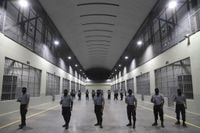The U.S. Supreme Court early Saturday halted the Trump administration’s ability to use the Alien Enemies Act to swiftly deport migrants to El Salvador who are being detained in portions of Texas, for now. The emergency order temporarily blocks the deportations until the high court resolves the American Civil Liberties Union’s (ACLU) emergency appeal, which was filed hours earlier over concerns that more deportation flights were imminent.
Justices Clarence Thomas and Samuel Alito, two of the court’s leading conservatives, dissented. The ACLU simultaneously asked several courts to immediately intervene Friday, warning that the Venezuelan migrants could otherwise be given life sentences in a notorious Salvadoran megaprison without the opportunity for judicial review.
“The Government is directed not to remove any member of the putative class of detainees from the United States until further order of this Court,” the Supreme Court’s order reads. The class extends to any migrant detained in the Northern District of Texas who is being removed under the 18th-century Alien Enemies Act. It does not apply elsewhere, though judges overseeing separate cases have temporarily blocked deportations for those detained in the Southern District of New York and the Southern District of Texas.
The 1798 law enables migrants to be summarily deported amid a declared war or an “invasion” by a foreign nation. The law has been leveraged just three previous times, all during wars, but Trump contends he can use it because the Venezuelan gang Tren de Aragua is effectively invading the U.S. The administration first invoked the law last month to deport more than 100 migrants to a Salvadoran megaprison.
On Friday, the ACLU pulled out all the stops as it raised alarm that another wave of deportations was actively underway, saying the administration was already busing migrants to the airport. Deputy Assistant Attorney General Drew Ensign pushed back at a lower court hearing, however, saying no deportation flights were scheduled for Friday or Saturday.
“But I have also been told to say that they reserve the right to remove people tomorrow,” Ensign cautioned.
The ACLU took an aggressive approach once it became aware of the deportations, giving U.S. District Judge James Hendrix, a Trump appointee in Texas who is overseeing the case, just minutes to act before the civil rights group began appealing Friday afternoon. Criticizing that short window, a three-judge 5th U.S. Circuit Court of Appeals panel unanimously denied the group’s appeal as premature early Saturday.
“We do not doubt the diligence and ability of the respected district judge in this case to act expeditiously when circumstances warrant,” the 5th Circuit’s unsigned ruling reads. “Petitioners insist that they tried to proceed before the district court in the first instance, and that the district court simply ‘refus[ed]’ to act. But the district court’s order today indicates that Petitioners gave the court only 42 minutes to act.”
The 5th Circuit panel comprised of Trump appointees Judge James Ho and Judge Cory Wilson, and Judge Irma Carillo Ramirez, an appointee of former President Biden. Separately, the ACLU had unsuccessfully asked U.S. District Judge James Boasberg, an appointee of former President Obama who serves in the nation’s capital, to block the deportations. Boasberg oversees the ACLU’s challenge to the original wave of March 15 deportations when Trump first invoked the Alien Enemies Act.
At the end of an emergency hearing Friday evening, Boasberg ruled he had no jurisdiction following the Supreme Court’s ruling last week that the migrants must challenge their removals where they are physically detained. The judge also found probable cause Wednesday to hold the Trump administration in criminal contempt for willfully disobeying his order to immediately halt deportations and turn around any airborne planes.
An appeals court on Friday temporarily blocked any contempt proceedings. The ACLU’s lead counsel in the case, Lee Gelernt, expressed relief that the Supreme Court intervened, stating, "We are relieved that the Supreme Court has not permitted the administration to whisk them away the way others were just last month."
The ACLU’s challenge highlighted that many of the detainees had received written notices of removal that were solely in English, with no clear instructions on how to contest their deportation. This raises serious concerns about the due process rights of the detainees, particularly those who may not fully understand the legal implications of the notices they received.
In a broader context, the Trump administration's use of the Alien Enemies Act has sparked significant legal battles and public outcry. The act, which has been invoked only a handful of times since its inception, was last used during World War II, when Japanese Americans were forcibly interned without trial.
As the legal fight continues, the implications of these deportations extend beyond individual cases. Critics argue that the administration's actions could set a dangerous precedent for immigration policy and civil liberties in the United States.
Senator Chris Van Hollen, a Democrat from Maryland, has been vocal about the implications of these deportations, particularly in light of the case of Kilmar Ábrego García, who was mistakenly deported to El Salvador. Van Hollen visited García in El Salvador and reported that he had been moved from the mega-jail Cecot to a new prison.
The ACLU's ongoing legal efforts aim to ensure that the rights of all detainees are respected and that they are afforded the opportunity to contest their deportations in court. As the situation develops, the balance between immigration enforcement and civil rights remains a contentious issue, with advocates on both sides closely monitoring the unfolding events.
In conclusion, the Supreme Court's decision to temporarily halt the deportations under the Alien Enemies Act reflects a significant moment in the ongoing debate over immigration policy and the protection of civil liberties in the United States. The legal ramifications of this case could have lasting impacts on the treatment of migrants and the use of wartime powers in domestic policy.







